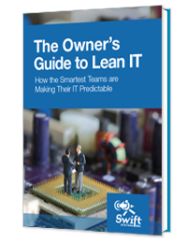
The Who, What, Where and Why of SOC 1 Reports
Let’s talk SOC 1 reporting. There can often be a lot of confusion around this type of audit. Who needs it? Who is audited? Why is it necessary? What is it?
What makes it even more confusing is the multiple types of SOC reports. For example, within SOC 1 there are two types, Type 1 and Type II which are used for different purposes. The same goes for SOC 2 reporting. There’s even SOC 3 reporting. It all make understanding the regulations that impact high-compliance IT a little confusing, to say the least.
For the purpose of this article we’re first going to focus on just understanding SOC 1.
What is SOC 1 Reporting?
SOC stands for Service Organization Controls. A service organization is a company that handles some of the details of another company’s business processes. For example, Company A doesn’t want to deal with their payroll processing. So they outsource it to Company B. Company B would be considered a service organization. This can apply to different aspects of running a business including data centers and Software-as-a-Service companies. When Company A undergoes a financial audit, Company B undergoes a SOC 1 audit if their services are impacting Company A’s finances.
As we mentioned earlier, there are two types of SOC 1 reports, both used for different purposes. A Type I report focuses on testing the design of a service organizations controls. They answer the question: Are their controls designed effectively? A Type I report does not include if these controls are operating effectively. On top of this, Type I reports cover a single point in time and do not cover a time period. Rather, they focus on a particular date.
Type II reports are fundamentally different from Type I reports, however they may sound similar at first. Whereas Type I reports cover a particular date, Type II reports cover a time period. Usually this stretches out over 12 months. Type II reports take a Type I report one step further and covers both the design of an organization’s controls and if they’re operating effectively.
Why Do You Need a SOC 1 Report?
SOC 1 reporting is focused on just the financial aspect of a service organization. SOC 2 reports also cover financial impacts of a service organization’s work, but in a more comprehensive overview that also covers operating procedures, vendor management, and regulations. A SOC 3 report is a simplified version of a SOC 2 report and is not as formalized.
While a SOC 2 report satisfies any regulations and a SOC 3 report is used for businesses without as many formal regulatory concerns, SOC 1 is a little harder to pin down. A SOC 1 report provides reasonable assurance that the design or design and effectiveness of whatever service the company is providing is of good enough quality in order to provide that service.
In short, if Company B is providing Company A with a data center, then a SOC 1 report shows Company A that Company B can provide what they’re saying they can provide.
A Type II report is more thorough than a Type I report. Type II reports tell Company A that a service organization not only has the capability to perform the services Company A needs, but that Company B can actually perform the services capably. A Type I report only tells Company A that Company B has the capability to perform the services. Not that Company B actually IS performing the services capably.
When Do You Need a SOC 1 Report?
A SOC 1 report is required when one of your clients goes through an audit. Oftentimes a client will tell you when a report is needed as the costs are not insignificant. However, a service organization can also obtain a SOC 1 report in advance. It can be a great way to differentiate between yourself and any competitors and provide proof of the services you offer.
SOC 1 reports can also be useful in efficiently answering questions a client may ask. It’s a great resource that can be made available to new clients for any capability questions. Due diligence questionnaires can also be bypassed by providing a SOC 1 report.
Who Needs A SOC 1 Report?
A SOC 1 report can be a useful resource for all service organizations who want to be taken seriously. It can provide areas for improvement as well as showcasing the strengths of your organization. Having a SOC report on hand also shows potential clients that you have the third party endorsement of your capabilities to back you up.
When service organizations work in the world of IT, a SOC 1 report can be useful when you’re working with SaaS or data centers. If you house a client’s financial information, a SOC 1 report can display your capability to house sensitive information and reassure your clients as to your organization’s competence.
Swift Systems Knows SOC 1 Reporting.
At Swift Systems we’re familiar with SOC 1 reporting. Heck, we’re familiar with SOC 2 and SOC 3 reports as well. We’re used to complying with even the strictest regulations when it comes to SaaS and data storage. Our managed compliance package is customizable to fit HIPAA, GMP, and GDPR regulations.
If you need to work with a service organization that knows regulatory compliance, work with Swift Systems. Contact us today to talk to a solutions expert.

IT systems are foundational to modern businesses. Too often, that foundation is unsteady. Unpredictable outages, insecure networks, and unreliable performance from mission-critical systems can jeopardize your entire business.
There’s a better way. Learn how.
Get in touch with us for a free consultation with one of our technical experts. We’ll review your current systems, assess your needs, and identify the coverage options to best meet them.
Get in touch with us by phone:


